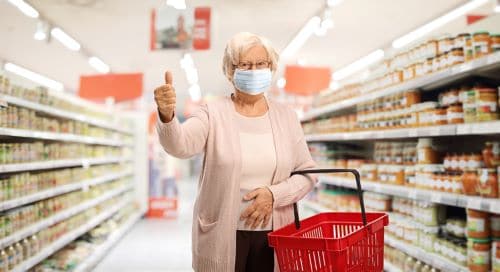Since the earliest days of the pandemic, doctors have known that masks prevent people infected with the coronavirus from spreading it to others.
But it was not clear whether masks stopped uninfected wearers from getting the disease.
Now, a new analysis definitively shows that masks do protect the wearer. They not only lower the chances of infection, but if a wearer does get COVID-19, a mask can lessen the severity of the illness.
Researchers from the University of California, San Francisco did a comprehensive review of studies on mask wearing. They found that masks may not stop all the virus from getting into your system, but they are still protective.
That’s because they reduce “viral dose.” In other words, masks reduce the amount of virus you inhale. This is crucial. [i]
Dr. Monica Gandhi led the study. “The more virus you get into your body, the more sick you are likely to get,” she said.[ii]
Research going back to the 1930s has shown that the amount of a virus you are exposed to determines how sick you get. Scientists found that the larger the amount of germs mice were exposed to, the more likely the rodents were to die.[iii]
In a 2015 experiment, researchers exposed human volunteers to different doses of a flu virus. The more virus they breathed in, the more likely they were to become ill and show symptoms.[iv]
The new study also points to research from the University of Hong Kong. Scientists infected a cageful of hamsters with the coronavirus. They placed a cage containing disease-free animals next to it. They had air flowing through the infected hamsters’ cage toward the healthy ones.[v]
They repeated the experiment but with surgical masks placed between the cages.
Without masks, two-thirds of the healthy hamsters were infected within a week. With the masks, the infection rate dropped to just 15%. And the few in the mask group that did become infected had less of the virus in their bodies compared to the ones who caught the disease without masks.
The Tale of Two Cruise Ships Hit by Coronavirus
Dr. Gandhi said that some of the strongest data comes from comparing two cruise ships.[vi]
When the coronavirus struck in February on Japan’s Diamond Princess. no one aboard was wearing masks. About 80% of passengers who became infected showed symptoms.
On a cruise in March from Argentina, all passengers were given masks as soon as some people became ill with COVID-19. Less than 20% of the passengers infected with coronavirus had any symptoms.[vii]
The cruise ship comparison suggests that skipping a mask could give you a much higher chance of suffering symptoms if you get a coronavirus infection.
“We’re saying that masks, which filter out a majority of viral particles can lead to a less severe infection if you do get one,” said Dr. Gandhi. “If you get infected, but have no symptoms—that’s the best way you can ever get a virus.”
5 Things You Need to Know About Masks
Help protect yourself and those around you. Masks should:[viii]
- Fit snugly. Avoid letting masks sag or stick out at the sides.
- Be removed the right way. Be sure not to touch your eyes, nose, or mouth when taking off your mask. And wash your hands immediately afterward.
- Have multiple layers of fabric. Just one layer protects less than two or more.
- Not interfere with normal breathing. You don’t need to smother yourself.
- Be washed after every use, if possible. A washing machine will sufficiently clean and sterilize the mask.
Mask wearing is something you do for those around you. But now you know it’s also something you do for yourself.
Editor’s Note: Discover the single best supplement for stronger immunity… The fruit extract that helps 93% of people with respiratory viruses get better in just two days… The germ hotspot that most of us forget to sanitize. Find all this and more in Independent Healing’s Coronavirus Pandemic Guide. Go HERE.
Related Articles
9 Coronavirus Symptoms You Should Watch For
Coronavirus: What You Need to Know About Exercising With a Mask
What’s the Coronavirus Risk of Going to a Football Game?
Like this Article? Forward this article here or Share on Facebook.
[i]https://ucsf.app.box.com/s/blvolkp5z0mydzd82rjks4wyleagt036
[ii] https://medicalxpress.com/news/2020-08-mask-youll-sick-covid-.html
[iii]https://academic.oup.com/aje/article-abstract/27/3/493/99616
[iv]https://pubmed.ncbi.nlm.nih.gov/25416753/
[v]https://medicalxpress.com/news/2020-05-hamster-masks-coronavirus-scientists.html
[vi]https://www.nytimes.com/2020/07/27/health/coronavirus-mask-protection.html
[vii]https://thorax.bmj.com/content/75/8/693
[viii]https://www.cdc.gov/coronavirus/2019-ncov/prevent-getting-sick/diy-cloth-face-coverings.html

